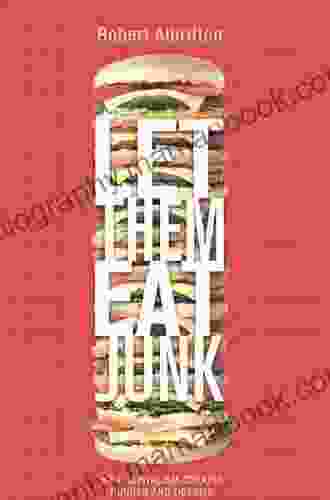Let Them Eat Junk: How Capitalism Creates Hunger And Obesity

In the era of convenience and indulgence, processed foods have become a staple in modern diets. Their alluring flavors, extended shelf life, and widespread availability have made them an irresistible choice for consumers seeking a quick and easy culinary fix. However, beneath the enticing facade lies a hidden epidemic, as the consumption of processed foods has reached alarming levels, with dire consequences for our health and society as a whole.
Unveiling the Processed Food Epidemic
Processed foods, broadly defined as foods subjected to alterations beyond basic preparation, such as freezing, canning, baking, or adding preservatives, have proliferated in our food system. They include everything from packaged snacks and sugary cereals to frozen meals and pre-made sauces. These foods, often heavily processed using various industrial techniques, contain a plethora of unhealthy ingredients, including:
4.3 out of 5
| Language | : | English |
| File size | : | 666 KB |
| Text-to-Speech | : | Enabled |
| Screen Reader | : | Supported |
| Enhanced typesetting | : | Enabled |
| Word Wise | : | Enabled |
| Print length | : | 272 pages |
- Added sugars: These empty calories contribute to weight gain, increased risk of heart disease, and type 2 diabetes.
- Unhealthy fats: Saturated and trans fats clog arteries and raise cholesterol levels, increasing the chances of cardiovascular disease and stroke.
- Sodium: Excessive sodium intake elevates blood pressure, posing a threat to heart health and other conditions.
- Artificial additives: Preservatives, emulsifiers, and artificial flavors can trigger inflammation, allergic reactions, and other adverse effects.
The prevalence of these processed foods is staggering. Studies have shown that processed foods account for approximately 60-70% of American's total calorie intake. This shift towards processed foods has alarming implications for our health and well-being.
The Devastating Health Consequences
The excessive consumption of processed foods has been linked to a multitude of health concerns, including:
- Obesity and overweight: Processed foods are typically calorie-dense, low in nutrients, and highly palatable, which promotes overeating and weight gain.
- Heart disease: The high levels of saturated and trans fats, sodium, and added sugars in processed foods contribute to the development of heart disease, the leading cause of death worldwide.
- Type 2 diabetes: Regular consumption of processed foods has been shown to increase insulin resistance, ultimately leading to type 2 diabetes.
- Cancer: Certain processed meats and processed foods containing refined carbohydrates have been associated with increased risk of cancer.
- Digestive issues: Processed foods often lack fiber, which can lead to constipation and other digestive problems.
The Societal Burdens of Processed Food
The impact of processed foods extends beyond individual health to society as a whole. The healthcare costs associated with diet-related diseases, largely attributable to the consumption of processed foods, are staggering. By fueling chronic illnesses such as heart disease, stroke, and obesity, processed foods burden healthcare systems and strain budgets.
Additionally, the rampant consumption of processed foods contributes to social inequality. Low-income communities often face limited access to fresh and healthy food options, due to factors such as lack of grocery stores, high costs, and transportation barriers. This disparity perpetuates health disparities and undermines efforts to promote overall well-being.
Empowering Consumers through Food Literacy
To combat the detrimental effects of processed foods, empowering consumers with food literacy is crucial. This entails providing accessible information about food sources, ingredients, and nutritional value. By understanding the contents of our food, consumers can make informed choices and prioritize healthier options.
Educational campaigns, nutrition labeling initiatives, and cooking classes can play a vital role in enhancing food literacy. Governments, public health organizations, and community groups can collaborate to disseminate accurate and practical nutrition information.
Reforming the Food System
Addressing the processed food epidemic requires systemic changes within the food system itself. Governments and food industry leaders must work together to:
- Promote healthier food production: Incentivize farmers to grow nutrient-rich fruits, vegetables, and whole grains.
- Regulate food manufacturing: Implement stricter regulations on the use of unhealthy ingredients and deceptive marketing practices.
- Support local food systems: Foster community-based food networks that provide access to fresh and affordable produce.
The Power of Individual Choices
While systemic interventions are essential, individual choices play a pivotal role in combating the processed food epidemic. Here are some tips for making healthier food choices:
- Choose whole, unprocessed foods: Opt for fruits, vegetables, whole grains, and lean protein sources.
- Limit processed snacks and sugary drinks: These foods are devoid of nutrients but high in unhealthy ingredients.
- Read food labels carefully: Pay attention to the serving size, calorie count, and ingredient list.
- Prepare meals at home: This allows for greater control over ingredients and portion sizes.
- Support local food businesses: Patronize farmers' markets, community gardens, and restaurants that prioritize fresh, whole foods.
The processed food epidemic poses a profound threat to our health and society. The overconsumption of these unhealthy foods contributes to a myriad of chronic diseases, burdens healthcare systems, and perpetuates social inequities. By empowering consumers through food literacy, reforming the food system, and making informed individual choices, we can chart a course towards a healthier future. Let's heed the call and ensure that everyone has access to nutritious and wholesome food, rather than succumbing to the corrosive effects of processed junk.
4.3 out of 5
| Language | : | English |
| File size | : | 666 KB |
| Text-to-Speech | : | Enabled |
| Screen Reader | : | Supported |
| Enhanced typesetting | : | Enabled |
| Word Wise | : | Enabled |
| Print length | : | 272 pages |
Do you want to contribute by writing guest posts on this blog?
Please contact us and send us a resume of previous articles that you have written.
 Top Book
Top Book Novel
Novel Fiction
Fiction Nonfiction
Nonfiction Literature
Literature Paperback
Paperback Hardcover
Hardcover E-book
E-book Audiobook
Audiobook Bestseller
Bestseller Classic
Classic Mystery
Mystery Thriller
Thriller Romance
Romance Fantasy
Fantasy Science Fiction
Science Fiction Biography
Biography Memoir
Memoir Autobiography
Autobiography Poetry
Poetry Drama
Drama Historical Fiction
Historical Fiction Self-help
Self-help Young Adult
Young Adult Childrens Books
Childrens Books Graphic Novel
Graphic Novel Anthology
Anthology Series
Series Encyclopedia
Encyclopedia Reference
Reference Guidebook
Guidebook Textbook
Textbook Workbook
Workbook Journal
Journal Diary
Diary Manuscript
Manuscript Folio
Folio Pulp Fiction
Pulp Fiction Short Stories
Short Stories Fairy Tales
Fairy Tales Fables
Fables Mythology
Mythology Philosophy
Philosophy Religion
Religion Spirituality
Spirituality Essays
Essays Critique
Critique Commentary
Commentary Glossary
Glossary Bibliography
Bibliography Index
Index Table of Contents
Table of Contents Preface
Preface Introduction
Introduction Foreword
Foreword Afterword
Afterword Appendices
Appendices Annotations
Annotations Footnotes
Footnotes Epilogue
Epilogue Prologue
Prologue Dave Matthes
Dave Matthes Dark Mistress Aurora
Dark Mistress Aurora Melinda Michelle
Melinda Michelle Kim Michele Richardson
Kim Michele Richardson Ben Jonson
Ben Jonson Timothy Brantley
Timothy Brantley Pooja Gupta
Pooja Gupta John Simmons
John Simmons Tiziano Bellini
Tiziano Bellini That Patchwork Place
That Patchwork Place Natasha Pelati
Natasha Pelati John W Creswell
John W Creswell C J Box
C J Box Justin Rhodes
Justin Rhodes Stephen Duneier
Stephen Duneier Keith Bishop
Keith Bishop Simon Singh
Simon Singh Cameron Thompson
Cameron Thompson Marina Bretta
Marina Bretta Jess Walter
Jess Walter
Light bulbAdvertise smarter! Our strategic ad space ensures maximum exposure. Reserve your spot today!

 Colin RichardsonReal Christians Must Choose: A Comprehensive Guide to Making the Right...
Colin RichardsonReal Christians Must Choose: A Comprehensive Guide to Making the Right... Ross NelsonFollow ·9.1k
Ross NelsonFollow ·9.1k Dwight BlairFollow ·6.3k
Dwight BlairFollow ·6.3k Rudyard KiplingFollow ·14.2k
Rudyard KiplingFollow ·14.2k Tim ReedFollow ·14.1k
Tim ReedFollow ·14.1k Gregory WoodsFollow ·10.7k
Gregory WoodsFollow ·10.7k Branden SimmonsFollow ·18.3k
Branden SimmonsFollow ·18.3k William WordsworthFollow ·14.2k
William WordsworthFollow ·14.2k Dion ReedFollow ·9.2k
Dion ReedFollow ·9.2k

 Barry Bryant
Barry BryantKnitting Pattern Kp190 Baby Sleeping Bags Sizes 3mths...
This easy-to-follow...

 Rudyard Kipling
Rudyard KiplingFolk Music Arrangements of Bartók: A Musical Tapestry of...
Béla Bartók, the renowned...

 Garrett Bell
Garrett BellThe Yellow House Memoir: A Literary Masterpiece that...
A Journey of Resilience,...

 George Martin
George MartinAssassin Witch Dark Faerie: The Bonegates
In the shadowy...
4.3 out of 5
| Language | : | English |
| File size | : | 666 KB |
| Text-to-Speech | : | Enabled |
| Screen Reader | : | Supported |
| Enhanced typesetting | : | Enabled |
| Word Wise | : | Enabled |
| Print length | : | 272 pages |














